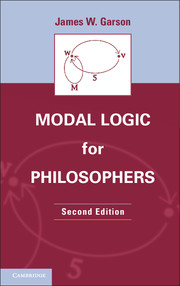Book contents
- Frontmatter
- Contents
- Preface to the Second Edition
- Preface
- Introduction: What Is Modal Logic?
- 1 The System K: A Foundation for Modal Logic
- 2 Extensions of K
- 3 Basic Concepts of Intensional Semantics
- 4 Trees for K
- 5 The Accessibility Relation
- 6 Trees for Extensions of K
- 7 Converting Trees to Proofs
- 8 Adequacy of Propositional Modal Logics
- 9 Completeness Using Canonical Models
- 10 Axioms and Their Corresponding Conditions on R
- 11 Relationships between the Modal Logics
- 12 Systems for Quantified Modal Logic
- 13 Semantics for Quantified Modal Logics
- 14 Trees for Quantified Modal Logic
- 15 The Adequacy of Quantified Modal Logics
- 16 Completeness of Quantified Modal Logics Using Trees
- 17 Completeness Using Canonical Models
- 18 Descriptions
- 19 Lambda Abstraction
- 20 Conditionals
- Answers to Selected Exercises
- Bibliography of Works Cited
- Index
Preface to the Second Edition
Published online by Cambridge University Press: 05 June 2014
- Frontmatter
- Contents
- Preface to the Second Edition
- Preface
- Introduction: What Is Modal Logic?
- 1 The System K: A Foundation for Modal Logic
- 2 Extensions of K
- 3 Basic Concepts of Intensional Semantics
- 4 Trees for K
- 5 The Accessibility Relation
- 6 Trees for Extensions of K
- 7 Converting Trees to Proofs
- 8 Adequacy of Propositional Modal Logics
- 9 Completeness Using Canonical Models
- 10 Axioms and Their Corresponding Conditions on R
- 11 Relationships between the Modal Logics
- 12 Systems for Quantified Modal Logic
- 13 Semantics for Quantified Modal Logics
- 14 Trees for Quantified Modal Logic
- 15 The Adequacy of Quantified Modal Logics
- 16 Completeness of Quantified Modal Logics Using Trees
- 17 Completeness Using Canonical Models
- 18 Descriptions
- 19 Lambda Abstraction
- 20 Conditionals
- Answers to Selected Exercises
- Bibliography of Works Cited
- Index
Summary
Preface to the Second Edition
In the years since the first publication of Modal Logic for Philosophers, I have received many suggestions for its improvement. The most substantial change in the new edition is a response to requests for a chapter on logics for conditionals. This topic is widely mentioned in the philosophical literature, so any book titled “Modal Logic for Philosophers” should do it justice. Unfortunately, the few pages on the topic provided in the first edition did no more than whet the reader’s appetite for a more adequate treatment. In this edition, an entire chapter (Chapter 20) is devoted to conditionals. It includes a discussion of material implication and its failings, strict implication, relevance logic, and (so-called) conditional logic. Although this chapter still qualifies as no more than an introduction, I hope it will be useful for philosophers who wish to get their bearings in the area.
While the structure of the rest of the book has not changed, there have been improvements everywhere. Thanks to several classes in modal logic taught using the first edition, and suggestions from attentive students, a number of revisions have been made that clarify and simplify the technical results. The first edition also contained many errors. While most of these were of the minor kind from which a reader could easily recover, there were still too many where it was difficult to gather what was intended. A list of errata for the first edition has been widely distributed on the World Wide Web, and this has been of some help. However, it is time to gather these corrections together to produce a new edition where (I can hope) the remaining errors are rare.
- Type
- Chapter
- Information
- Modal Logic for Philosophers , pp. xi - xiiPublisher: Cambridge University PressPrint publication year: 2013



